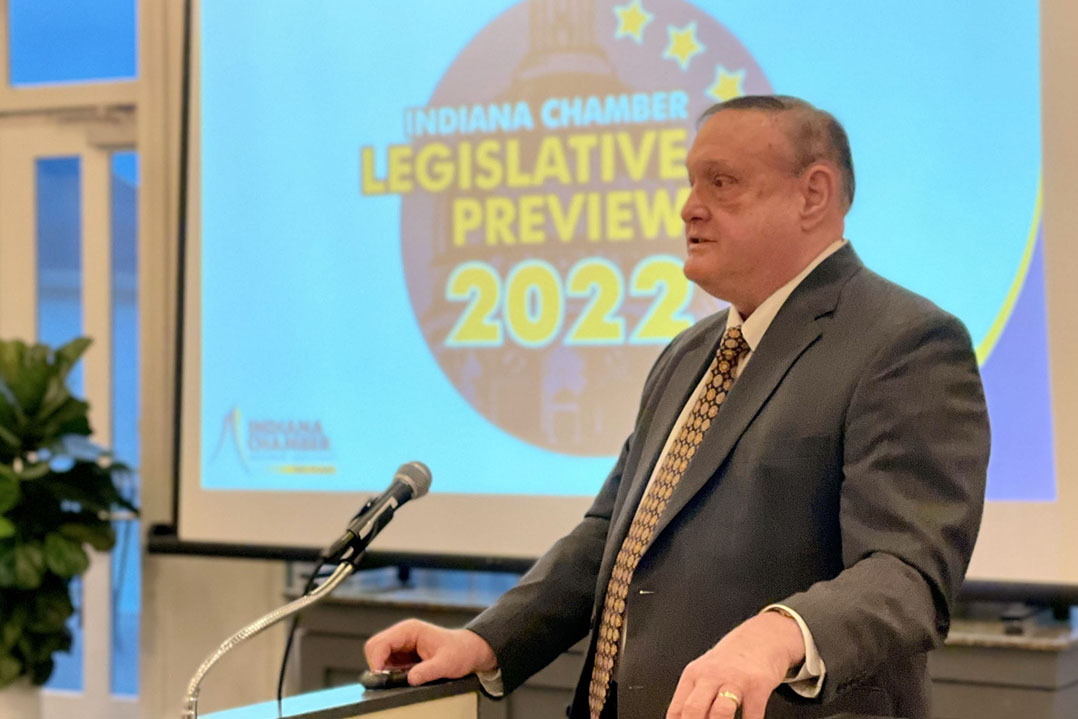Indiana Chamber of Commerce President Kevin Brinegar spoke on the organization’s key 2022 legislative issues during a Dec. 10 legislative session preview breakfast at The Bridgewater Club in Westfield. The event was co-presented by the Westfield Chamber of Commerce, Noblesville Chamber of Commerce, OneZone Chamber of Commerce and Northern Hamilton County Chamber of Commerce.
Brinegar said the chamber’s top priorities for 2022 are economic recovery and modernization; education and workforce development; energy and environment; taxation; technology; and workers’ compensation.
Upcoming legislative session updates are Jan. 14, 2022, Feb. 11 and March 11. Each event is from 7:30 to 9 a.m. at the Bridgewater Club, 3535 E. 161st St. Registration can be completed at any of the participating chamber’s websites.
ECONOMIC RECOVERY AND MODERNIZATION
Brinegar said one of the chamber’s top priorities is opposing government mandates regarding vaccine requirements.
“We don’t want the federal government telling employers they must vaccinate, and if they don’t get vaccinated, they have to fire them,” Brinegar said. “We don’t want the state to do what Tennessee and a couple other states have done. We believe the employers are in the best position to decide their best policy.”
Other economic recovery and modernization priorities include increasing incentives for attracting remote workers to Indiana and support measures to promote entrepreneurship in the state, such as expanding venture capital investment tax credit eligibility, promoting entrepreneurship in youth via access to grants and curriculum and opening pathways to create startup businesses for people 18 and under.
EDUCATION AND WORKFORCE DEVELOPMENT
Brinegar said his top two priorities in these areas are to support measures that enhance early child care access and quality and support strengthening college and career readiness for Indiana students.
“The lack of affordable, high-quality childcare across Indiana is one of the outside factors most negatively impacting attracting and retaining workers,” a handout from the Indiana Chamber stated.
Brinegar said he wants to address college and career readiness by alleviating the business liability burden for students under 18 who participate in work-based learning experiences; strengthening graduation pathway requirements and aligning those more seamlessly with Indiana high school diploma options; and creating potential for members of the business community to serve as adjunct faculty at K-12 schools.
ENERGY AND ENVIRONMENT
Much of Brinegar’s discussion on energy focused on solar.
“Right now, we have a hodgepodge of rules and guidelines and, in some cases, prohibitions,” Brinegar said. “We have this contradiction where more and more Hoosiers want us to have renewable energy and want to have access to renewable energy, but when it comes to siting windmills and solar farms, they say, ‘Not in my backyard.’ Folks, we can’t have it both ways. Some counties are banning windmills altogether. Let’s have one statewide standard. Right now, we are losing out on investments in renewable energy because of complications because of prohibitions, etc.
“If you have to transport renewable energy, it’s very expensive. It’s much better to have right near the homes and businesses it is trying to serve. It’s going to be a tough push up the hill, but we are going to continue to make the point we need a statewide standard.”
TAXATION
Brinegar said the Indiana Chamber opposes any substantial change to the structure of the Indiana Tax Court as an independently operating judicial court of special jurisdiction. The Chamber supports maintaining and enhancing the state’s “attractive tax climate.” He said business personal property continues to be the tax area where Indiana stands out negatively because there is a 30 percent depreciation floor that applies to all personal property assessments.
“Many states don’t tax machinery and equipment, and those who do don’t tax as high as we do,” Brinegar said. “It’s a big source of local income for local government. It’s an elephant that can’t be swallowed all at once, but we’d like to take a bite out of it.”
Regardless of how old business equipment is or how much it has depreciated, he said business owners still have to pay property taxes on no less than 30 percent of the equipment, even if the equipment has depreciated to only 10 percent of its original value.
“It makes no sense,” Brinegar said. “That’s something we’d like to tackle this session.”
TECHNOLOGY
The Indiana Chamber supports the expansion of research and development, manufacturing, testing and deployment of electric vehicles. Brinegar said by 2025, electric vehicles will account for 10 percent of all vehicle sales globally and are expected to increase to 58 percent by 2040.
WORKERS’ COMPENSATION
The Indiana Chamber supports a cap on reimbursement for ambulatory surgical centers when it comes to worker’s compensation. Brinegar said cost savings from tying the ambulatory surgical centers workers’ compensation reimbursement rates to Medicare will provide increased benefits without a subsequent increase in employer raters.





